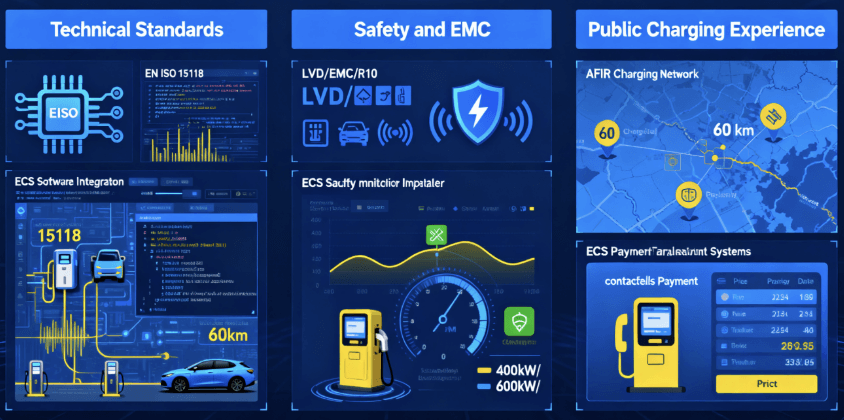ECS Adapts to EU's Stringent EV Charging Regulations for Overseas Expansion

**February 1, 2026 ** - EV CHARGE SOFTWARE (ECS), a leading overseas EV charger operation and maintenance platform, is gearing up to meet the complex and evolving regulatory landscape of electric vehicle (EV) chargers in the European Union. As the EU continues its push towards a sustainable transportation future, a comprehensive set of regulations has been put in place to ensure the safety, interoperability, and efficiency of EV charging infrastructure. ECS, with its global expertise, is well-positioned to assist its clients in the EU in complying with these regulations and optimizing their charging operations.
Stringent Technical Standards for Charger Compatibility
In a significant move to standardize the EV charging ecosystem, the EU introduced Delegated Regulation (EU) 2025/656 on June 18, 2025. This regulation—amending the Alternative Fuels Infrastructure Regulation (AFIR)—outlines specific technical requirements for the physical interfaces and communication compatibility of public and private chargers, with phased enforcement timelines:
1. Phase 1 (January 8, 2026): Public Charger Compliance
All new or renovated public chargers must adhere to the EN ISO 15118 series of standards, including:
- EN ISO 15118-1:2019 (general definitions and terminology)
- EN ISO 15118-2:2016 (network and application layer protocols)
- EN ISO 15118-3:2016 (physical and data link layers)
- EN ISO 15118-4:2019 (compatibility testing for network/application layers)
- EN ISO 15118-5:2019 (conformance testing for physical/link layers)
2. Phase 2 (January 1, 2027): Private & Plug & Charge Compliance
- All new public and private chargers must support EN ISO 15118-20:2022 (the latest update for smart charging capabilities).
- Chargers with "Plug & Charge" functionality (automatic authentication/authorization) must additionally support both EN ISO 15118-2:2016 and EN ISO 15118-20:2022.
ECS is proactively integrating these standards into its software, ensuring chargers on its platform can seamlessly communicate with EVs and meet EU interoperability mandates.
Safety and Electromagnetic Compatibility (EMC) Regulations
The EU prioritizes safety through three core regulatory frameworks, all of which ECS helps clients navigate:
1. Low Voltage Directive (LVD 2014/35/EU)
Applies to chargers operating at 50V–1000V (AC) or 75V–1500V (DC), mandating design features to prevent electrical hazards (e.g., shock, fire, overheating). ECS provides software tools to monitor charger voltage levels and trigger safety shutdowns if thresholds are breached.
2. Electromagnetic Compatibility Directive (EMC 2014/30/EU)
Requires chargers to avoid interfering with other electronic devices and remain immune to external electromagnetic disturbances. ECS’s platform includes EMC compliance checks for connected chargers.
3. UN ECE R10 (2023 R10.06 Update)
Focuses on EMC for automotive-related equipment, with new requirements for EV chargers:
- Strict emission limits: ≤50dBμV/m for radiation emission (RE) and conduction emission (CE) in the 30MHz–1GHz range.
- Immunity testing: Withstand 100V/m radio-frequency electromagnetic fields.
- 800V high-voltage systems: Enhanced transient immunity and coordinated test data with on-board charging modules (OBCMs).
- Broadband noise testing: Compliance with CISPR 32 standards.
ECS partners with clients to validate compliance, offering technical support for EMC testing and software adjustments.
Regulatory Oversight for Public Charging Experience
The AFIR sets binding targets to improve accessibility and reliability for public charging, with ECS solutions aligned to each requirement:
1. Infrastructure Density & Power Targets
- TEN-T Core Roads: A charger every 60km (each direction) for light vehicles.
- Power Output: By end-2025, charging pools must have a minimum 400kW total output (with at least one 150kW+ port); by end-2027, this rises to 600kW total output.
2. Transparency & Payment Accessibility
- Price Transparency: Operators must display clear, comparable pricing (per kWh, time, or flat rate) on all platforms (apps, chargers, websites).
- Contactless Payments: All new public chargers >8kW must support contactless options (Visa, Mastercard, Apple Pay) by November 2024.
3. Data Sharing & User Support
- Open Data: Operators must share real-time charger data (location, speed, availability) with third-party apps/maps (e.g., Google Maps, in-vehicle systems).
- 24/7 Helplines: Free round-the-clock support for drivers facing charging issues.
ECS’s platform includes modules for dynamic pricing, contactless payment integration, and automated data sharing—helping operators meet AFIR mandates.
ECS's Role in the EU Market
“The EU’s regulations are designed to build a unified, reliable charging network—but they require specialized expertise to navigate,” said [Michael Chen, ECS CEO]. “ECS’s EU-tailored solutions turn compliance into a competitive advantage for our clients.”
Key ECS services for EU clients:
- Pre-Compliance Audits: Validate chargers against EN ISO 15118, LVD, EMC, and UN ECE R10 standards.
- Real-Time Compliance Monitoring: Track uptime, data sharing, and safety metrics to meet AFIR and national requirements.
- Multilingual Support: English, German, French, Spanish, and Italian-speaking teams provide on-site and remote assistance.
- Software Updates: Automatic patches to align with regulatory changes (e.g., new EN ISO 15118 versions).
Next Steps for EU Clients
Interested in ensuring EU regulatory compliance for your EV charging business?
- Request a free compliance assessment: Visit [https://evchargesoft.com/]
- Contact ECS’s EU team: info@EVchargesoft.com
- Register for ECS’s webinar: “Navigating 2026–2027 EU Charging Rules” (March 10, 2026)
About ECS (EV CHARGE SOFTWARE)
ECS is a global leader in overseas EV charger operation and maintenance platforms, supporting clients in 30+ countries. With deep expertise in EU regulations, ECS helps manufacturers, chargepoint operators (CPOs), and site hosts comply with local rules while optimizing operational efficiency. Its solutions are designed to align with the EU’s Green Deal and carbon-neutrality goals, driving sustainable growth in the EV charging sector.